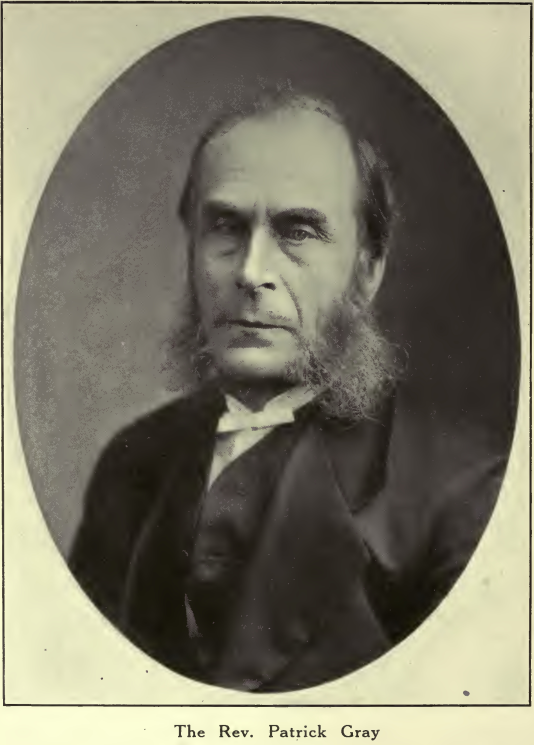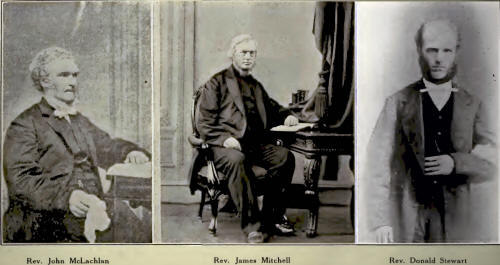|
THE Rev. Dr. Robert Burns, who had recently become pastor
of Knox Church, Toronto, succeeding the Rev. James Harris, the first
Presbyterian pastor of that place, who settled there in 1820, preached
in the Scotch Block on June 18, 1845, from Rev. 3: 4. On December 15 of
the same year a congregation was organized in connection with the Free
Presbyterian Church by the Rev. William Rintoul of Streetsville and the
Rev. James Harris. 'Mr. Rintoul named the new organization “Boston
Church’’ in honor of the Rev. Thomas Boston, pastor of Ettrick in
Scotland from 1705 to 1732, and author of “The Fourfold State of Man,”
and other works. Mr. Rintoul probably knew that James Laidlaw, Sr., and
his three sons, Andrew, James and Walter, came from Ettrick, and
believed that as “Mr. Boston’s valuable writings, contributed much to
promote the advancement of vital Christianity,” “Boston Church” would be
a very suitable name. Students from Knox College and visiting ministers
supplied the Church for some time. Among those who did so, we find the
names of McPherson, Currie, Gray, Scott, Southerland, Bell, Ross, Nisbet,
Rintoul, Rogers, W. C. Burns (Missionary to China) and Angus McColl. In
1847 Boston Church became connected with Union and Norval as a
Supplementary Station, and enjoyed the services of The Rev. Patrick Gray
for more than three years. In 1850 Mr. Gray received a call to Beckwith
in the Presbytery of Ottawa, and accepted it, notwithstanding great
efforts made by the people to keep him, for he was greatly admired and
beloved by them. He lived while pastor there in Carleton Place.
He afterwards became a pastor in Kingston and after a
ministry of several years died there. He was the father of the late
Harper Gray, pastor of Old St. Andrew’s Church, Toronto.
In 1851 Boston congregation was united with the Acton
congregation, which had been organized in 1845, and the two
congregations

jointly gave a call to The Rev. John McLachlan to become
their pastor, and he was inducted on August 21, of that year. He was a
native of Argyleshire, Scotland, born in 1804, educated in-King’s
College, Aberdeen, and at the University of Glasgow. He was sent to
Canada as a missionary by the Reformed Synod of Scotland, and preached
for a time in Toronto, but finding only a few members of the Reformed
Church in this part of Canada, he joined the Free Church, and accepted a
call to Boston and Acton. He was a spiritual, earnest and faithful
minister of the Gospel, and held in high esteem. He spoke with fervor,
in a strong voice, and was very impressive. It was a lesson in reverence
to hear him begin the service in the following words, quoted recently to
the writer by a man who was young when Mr. McLachlan preached to the
Boston congregation:—“Let us endeavor to have pur minds reverently
composed, and in humble dependence upon the Divine will let us worship
God by singing to His praise in the 119th Psalm:—
"Blessed are they that undefiled,
And straight are in the way,
Who in the Lord’s most holy law
Do walk and do not stray.
Blessed are they who to observe.
His statutes are inclined,
And who do seek the living God
With their whole heart and mind.”
A boy hearing Mr. McLachlan preach always remembered his
expression:—“The fleeting hour is on the wing that shall lay thee with
the dust," and a venerable lady, Mrs. Ninian Lindsay, recently deceased,
who was a girl in his congregation in Acton, spoke of the dignity with
which he went up the pulpit stairs.
In 1851 the word “Managers” for the first time appears in
the Church records, they taking the place of the former trustees. At a
meeting of the congregation on July 28., pursuant to public notice,
Duncan McColl being Chairman, and The Rev. Patrick Gray, who was
present, acting as clerk: “It was resolved that a body of five managers
be annually elected from among members of the congregation at an annual
meeting lawfully called to superintend, and transact the secular affairs
and business of the congregation.” Their duties were defined and made
subject to such change as circumstances should require. ' In 1854 their
number was increased to seven.
At Xhe Annual meeting of 1853 the congregation voted to
contribute a quantity of bricks for the house of Mr. McLachlan in Acton,
and on account of the high rates of living his salary was increased. It
would seem to be a mistake to suppose that the H. C. of L., (high cost
of living) is of recent origin. It is really an ancient complaint, and
has symptoms of being chronic.
On December 26, 1854, the followng resolution was passed
by the congregation:—“As the meeting is sensible of the infirm state of
health of our dear pastor, The Rev. John McLachlan, sympathizing with
his consequent inability to continue the oversight of such a wide field
of labor, and hoping by his labors being confined to a narrower sphere
he will enjoy a longer course of usefulness, 'we are constrained to
acquiesce in the memorial of our brethren in Acton to the Presbytery of
Toronto for a dissolution of the union now existing between the
congregations of his present charge.”
Mr. McLachlan continued pastor of the Acton Church till
1861, when he accepted a call to Beaverton, where he died on June 2,
1870, universally esteemed. Boston Church was without a pastor for about
two years, and was supplied mainly by students, among them being Mr.
James Blount, who remained for a summer in the home of Mr. Walter
Laidlaw.
At. a meeting of Boston congregation on October 23, 1855,
delegates appeared from Milton, which had been recognized a Station in
July, and it was decided to petition Presbytery for supply for both
congregations. .This was the beginning of a union of the two
congregations which continued for thirty-two years.
On January 4, 1856, a meeting was held to consider a
proposal for union of the Boston a^d the United Presbyterian
congregations. A committee consisting of Andrew Laidlaw, Walter Laidla\y; Alexander
Duff, Hugh McColL and James Robertson was appointed to confer with a
committee of the United Presbyterian Congregation, consisting of A.
McNaughton, John Stewart, William Michie sr., Duncan Campbell and Thomas
Hume. Andrew Laidlaw was made Chairman .and John Stewart, Secretary. At
this meeting of the two committees it was resolved that a union is most
desirable not only between the two
local congregations, but between the two Synods, and it was decided to
memorialize the Synods praying for such a union. John Stewart and Walter
Laidlaw were appointed to prepare the petition, and submit it at a
meeting of the committees on March 4th. Omitting the preamble it was as
follows:—

1. “That we, your memorialists, deeply feel th'6
withering influence of divisions among us, the desirableness of
Christian union, and that for its attainment everything that is not
vital should be abandoned.
2. “That Union between the Presbyterian Church of Canada,
and the United Presbyterian Church in Canada, is particularly desirable
for the best interests of the respective Churches, and the country in
which we dwell.
3. “That beside the general, there are special reasons
for contemplating such a union. With the exception of some theoretical
differences, the ministers and people of the two Churches are one in
doctrine, worship, sentiment and habit, and so much so that a stranger
visiting their congregations or families could not tell the one from the
other. Even the theoretical differences are practically ignored. Both
Churches now act on the voluntary principle, and assert the Church’s
independence of secular control. Both maintain that righteousness exalts
a nation, that all men are responsible to God for their conduct, that
the Sabbath is a divine institution, and to be sacredly observed, and
that both Churches have borne witness, and contended for these, and
other truths of God’s Word.
4. “That the sad consequences of division are apparent in
needless separation and antagonism, in the settlement of ministers in
localities where they could be spared, while other places remain
destitute of the means of grace, and the cry is heard that the people
perish for lack of knowledge; while from the divisions caused among
relatives, and in neighborhoods there is reason to fear a spirit of
coldness, and mere formalism is produced that is threatening to destroy
the life of faith altogether. Wherefore, for these and other reasons
that might be adduced, we respectfully request and implore you to take
this matter into prayerful consideration, and do what in you lies to put
an end to the evils we are now deploring. And we pray, and1 will pray,
that the Lord Jesus Christ, the great Shepherd of the sheep, may go
before you, and show the way, and that in this case His own prayer will
be fulfilled : ‘ That they all may be one, as Thou, Father art in me,
and I in Thee, that they may be one in us; that the world may believe
that Thou has sent me.’ ”
ANDREW LAIDLAW, Chairman.
JOHN STEWART, Secretary. |
